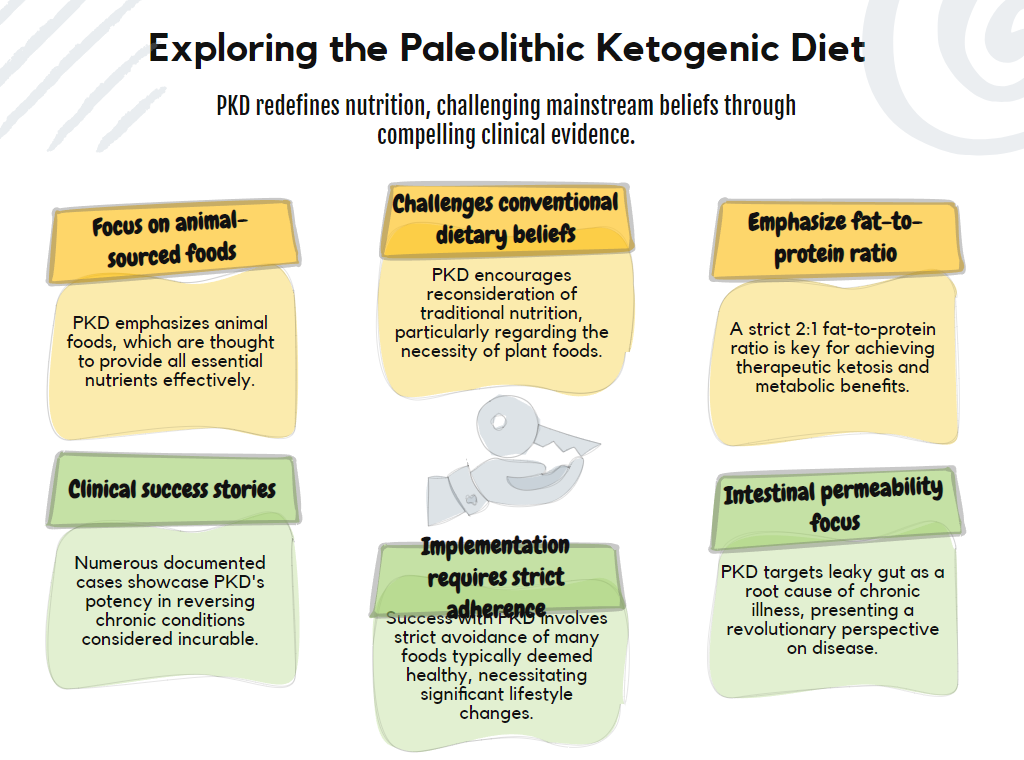
The Controversial Diet Reversing "Incurable" Diseases
The Controversial Diet Reversing "Incurable" Diseases
What if the most effective therapeutic diet contradicts nearly everything mainstream nutrition recommends?
While Paleo and Keto diets have gained popularity for weight loss and general health, a lesser-known variant called the Paleolithic Ketogenic Diet (PKD) quietly produces remarkable clinical results for conditions traditional medicine considers incurable.
This approach isn't simply low-carb or grain-free. It represents a fundamental rethinking of human nutrition based on clinical evidence rather than popular trends.
Beyond Paleo and Keto
Most people familiar with ancestral eating understand the basic Paleo premise: eat foods available to our hunter-gatherer ancestors while avoiding modern processed foods, grains, and dairy. The ketogenic diet, meanwhile, focuses on achieving metabolic ketosis through high-fat, moderate-protein, and minimal-carbohydrate intake.
PKD combines elements of both but with crucial distinctions.
Developed in 2010-2011 by Dr. Zsofia Clemens and Dr. Csaba Tóth, PKD emerged when they discovered that the popularized version of the Paleolithic diet was insufficient for reversing chronic illness. Their clinical observations revealed that an all-animal, high-fat ketogenic approach produced superior results.
Unlike standard Paleo, PKD eliminates all plant foods or severely restricts them. Unlike conventional ketogenic diets, PKD emphasizes specific animal-sourced foods and maintains strict fat-to-protein ratios.
The protocol typically recommends a 2:1 fat-to-protein ratio by weight, translating to approximately 82% of calories from fat and 18% from protein. This precise balance is crucial for maintaining therapeutic ketosis.
The Root Cause Revolution
What makes PKD particularly compelling is its mechanism of action.
Dr. Clemens and her team at Paleomedicina Hungary have treated thousands of patients using this approach. Their research indicates that PKD uniquely heals intestinal permeability (leaky gut), which they believe is the underlying cause of most modern chronic conditions.
This represents a paradigm shift in understanding disease. Rather than viewing autoimmune conditions, metabolic disorders, and other chronic illnesses as distinct entities requiring separate treatments, PKD addresses what may be their common root.
The clinic measures intestinal permeability using the PEG400 challenge test, demonstrating that PKD normalizes intestinal permeability while other diets—including standard ketogenic and paleo diets—do not consistently achieve this outcome.
This finding explains why even "healthy" plant-based diets may fail to resolve certain conditions. Many plant compounds can irritate the gut lining in susceptible individuals, perpetuating the cycle of inflammation and immune dysregulation.
Clinical Evidence
The results reported by Dr. Clemens and her team challenge conventional medical wisdom.
In one notable case, a patient with severe Crohn's disease experienced complete resolution of symptoms on PKD. Laboratory parameters normalized, and imaging confirmed gradual healing of bowel inflammation. The patient discontinued medication within two weeks and remained symptom-free after 15 months on the diet.
Other documented cases include:
• Children with type 1 diabetes achieving regular blood sugar without insulin (when started early in disease progression)
• Complete remission of autoimmune conditions like rheumatoid arthritis and multiple sclerosis
• Significant improvements in epilepsy, cancer, and psychiatric disorders
While individual results vary, the pattern suggests that PKD addresses fundamental aspects of human physiology that other interventions miss.
The Nutritional Paradox
A common objection to all-animal diets is nutritional adequacy. Conventional wisdom holds that humans need vitamins, minerals, and fiber from plant foods.
Dr. Clemens challenges this assumption. Her research indicates that animal foods provide all essential nutrients in highly bioavailable forms. Organ meats like liver, brain, and bone marrow are exceptionally nutrient-dense.
The diet's high fat content ensures proper absorption of fat-soluble vitamins. Counter-intuitively, vitamin C requirements decrease substantially on a low-carbohydrate diet due to reduced metabolic competition with glucose.
Fiber, often cited as essential for gut health, may irritate compromised intestinal linings. PKD practitioners report improved digestion without plant fiber, contradicting conventional nutritional theory.
Implementation Challenges
Despite promising results, PKD faces significant barriers to wider adoption.
The protocol requires strict adherence, especially in the initial healing phase. This means eliminating many foods most people consider healthy, including fruits, vegetables, nuts, and seeds.
Social factors also present challenges. Eating primarily meat and animal fat contradicts decades of dietary guidelines and cultural norms. Patients often face resistance from family members, friends, and healthcare providers.
Cost can be another consideration. High-quality animal products generally cost more than processed foods or plant staples. However, many PKD practitioners report eating less frequently due to increased satiety, potentially offsetting some expense.
The Future of Therapeutic Nutrition
PKD represents more than just another diet trend. It challenges fundamental assumptions about human nutrition and disease processes.
If Dr. Clemens and her team are correct about intestinal permeability being the common denominator in chronic disease, the implications extend far beyond dietary recommendations. The entire approach to treating autoimmune conditions, metabolic disorders, and even some cancers may need reconsideration.
While PKD remains controversial, its clinical results demand attention. The approach offers a testable hypothesis with measurable outcomes, providing a framework for further research and refinement.
For patients with conditions unresponsive to conventional treatments, PKD presents an option based on evolutionary biology and clinical observation rather than population statistics or food industry influence.
As healthcare continues toward personalized approaches, PKD's emphasis on addressing root causes rather than symptoms aligns with emerging paradigms in precision medicine.
Beyond Dogma
The most valuable aspect of PKD may be its challenge to nutritional dogma. It forces us to question assumptions about what constitutes a healthy human diet.
Whether PKD becomes widely accepted or remains a specialized therapeutic tool, its existence reminds us that nutrition science continues to evolve. What seems inevitable today may be questioned tomorrow as new evidence emerges.
This evolution offers hope to those suffering from chronic conditions. When conventional approaches fail, alternatives like PKD provide new avenues for healing based on different premises about human biology and disease.
The true test of any therapeutic approach is its results. By this measure, the Paleolithic Ketogenic Diet deserves serious consideration, regardless of how it challenges our preconceptions about nutrition and health.
